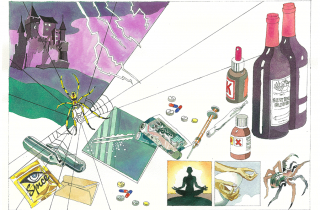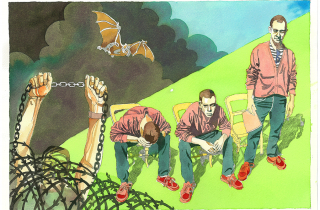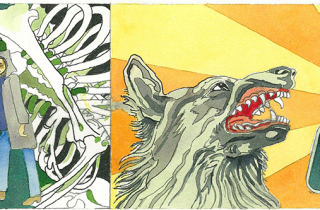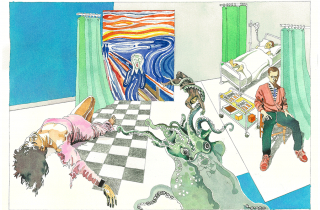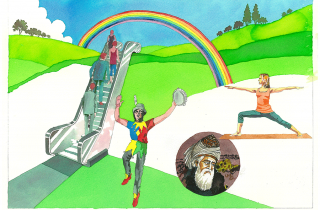Is this how you feel right now? It’s how I felt when I first went for help.
I felt my son was the problem and if he could be fixed, then life would be fine again. We would all be released from our collective nightmare and be ‘normal’ once more. I just needed to find the counsellor or other professional who would take care of everything and solve this problem of my son. Over time, I found out just how wrong I was.
Now – when you read the next sentence below you’ll probably be outraged. You may well be so furious that you vow never to come to this site again. That’s OK. Feel the fury.
Are you sitting comfortably? Take a deep breath. You are part of “The Problem”. You need “fixing” just as much as your son or daughter does.
What you’ve just read can take a long time to recognise as a truth. Hurts, doesn’t it? Go ahead and swear at me if you like (I can’t hear you). It doesn’t matter how long it takes for you to come to terms with this bombshell. And you don’t have to if you don’t want to. I clung to the idea that I didn’t need fixing like a barnacle clings to a ship.
But here’s the thing.
Studies show that the Addict’s chances of recovery are increased exponentially when family members work on a recovery programme of their own. If your son goes into re-hab and when he comes out, you have changed nothing about your own behaviour, you are setting him up for failure and relapse.
What I’m giving you here is the wisdom of all the major authorities on the healing of the Family around the Addict. This is wisdom that I’ve collected from attending Families Courses run by Clouds House (Action on Addiction) and the Cirque in Utah in the US. It’s wisdom that I’ve found in Al-Anon literature and other books on Addiction. (You can find a list of books in ‘Resources’ in the Find Help section).
So what is our part in all this?
Gradually over time the way we have interacted with our beloved child has brought about this situation. Maybe we didn’t set boundaries. If we had a strict upbringing ourselves, we may have wanted to be ‘liberal’ parents. Or if we were rebels ourselves, we may have been determined that our kids won’t be rebels, and so tried to control how they lived their lives. Both these styles of parenting can have unforeseen consequences. We probably didn’t understand how to communicate honestly and openly with our children (perhaps because we had no model for this as we were growing up ourselves). We may have allowed ourselves to be manipulated, gone into denial when our kids first used drugs in the house, and then tried to manipulate them out of their ‘bad behaviour’. We may have given them money when we knew we shouldn’t.
That’s a lot to think about. Don’t be downhearted though. You’re in good company, because there are thousands of parents who are in the same boat. And there’s some good news for you:
You did the very best you could with the resources available to you.
And yes – I know you can bring to mind many other parents who didn’t do their parenting any differently from how you did (you may think they were ‘worse’ parents than you have been). And you’re thinking: “why hasn’t this happened to them?”
I can’t answer that. Life is unfair. However – one important thing to remember is that there is an addictive gene. It is highly likely that your son or daughter will have that gene. Examine your families of origin for both parents. You are likely to find that there has been Addiction of some sort in one or both of your families.
And – dare I say it – maybe one or both of you parents has an addictive personality? One or both of you drink too much (or did in the past but got it under control)? The other family trait that Addiction springs from is obsessive or compulsive behaviour, such as over-exercising or being a workaholic. (This comes from the same area of the brain that is responsible for Addiction).
Remember – none of this is your fault. But in order to find a way through our challenges, we first need to understand where they came from.
(NOTE: There are one or two exceptions to addiction running in families. These exceptions arise out of a child experiencing trauma or treatment with morphine for cancer. In these circumstances, someone can develop addiction where there is no history of addiction from either side of the family).
When you’re ready, you may find it helpful to read the post Breakthrough – Part 1, which begins: “OK – I recognise I’m part of the problem. Where do I begin?”
Recognising that we have played our part in all this is actually a cause for celebration – because then we can start to shed the heaviness and negative emotions we’ve been carrying round with us.
Recognising our part in all this is the key that unlocks the door to Recovery. We hear a lot about Recovery for the Addict, and not enough about Recovery for families. One of the most effective strategies we can employ in reaching for a better life, is to take the searchlight off our Addict and direct it at ourselves. That is how we walk away from darkness and towards the light.

